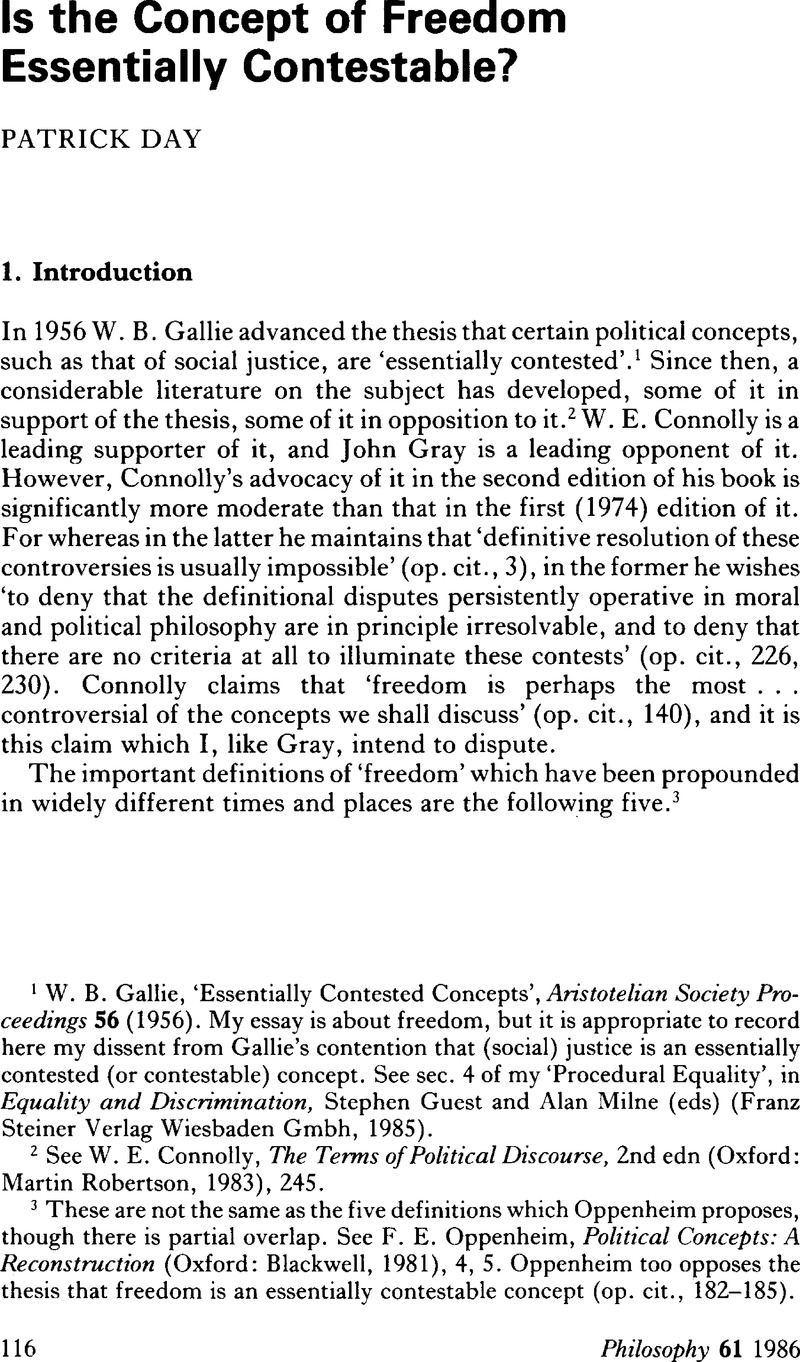Article contents
Is the Concept of Freedom Essentially Contestable?
Published online by Cambridge University Press: 30 January 2009
Abstract

- Type
- Discussion
- Information
- Copyright
- Copyright © The Royal Institute of Philosophy 1986
References
1 Gallie, W. B., ‘Essentially Contested Concepts’, Aristotelian Society Proceedings 56 (1956). My essay is about freedom, but it is appropriate to record here my dissent from Gallie's contention that (social) justice is an essentially contested (or contestable) concept. See sec. 4 of my ‘Procedural Equality’, in Equality and Discrimination, Stephen Guest and Alan Milne (eds) (Franz Steiner Verlag Wiesbaden Gmbh, 1985).CrossRefGoogle Scholar
2 See Connolly, W. E., The Terms of Political Discourse, 2nd edn (Oxford: Martin Robertson, 1983), 245.Google Scholar
3 These are not the same as the five definitions which Oppenheim proposes, though there is partial overlap. See Oppenheim, F. E., Political Concepts: A Reconstruction (Oxford: Blackwell, 1981), 4, 5. Oppenheim too opposes the thesis that freedom is an essentially contestable concept (op. cit., 182-185).Google Scholar
4 Mill, Liberty, v. This, however, is only one of Mill's views about the definition of ‘liberty’. Most of the time he accepts Bentham's definition (the Fourth Definition, below). But sometimes he accepts the Second Definition (below). It is extraordinary that the author of the most famous philosophical work on liberty, who is usually so careful about questions of meaning, should apparently have been blind to the importance, and to the difficulty, of defining the word ‘free’. See Ten, C. L., Mill on Liberty (Oxford: Clarendon Press, 1980), 72–73.Google Scholar
5 Plato, Republic, 430–448. For Plato, the free man is also the just man.
6 Spinoza, Ethics, IV, V.
7 See Long, D. G., Bentham on Liberty (Toronto: University of Toronto Press, 1977), 54–55.Google Scholar
8 Rousseau, Social Contract, I, viii. Cf. Kant, Foundations of the Metaphysics of Morals, III, i.
9 See Austin, J. L., ‘A Plea for Excuses’, in his Philosophical Papers, Urmsonand, J. O.Warnock, G. J. (eds) (Oxford: Clarendon Press, 1961), 139–141.Google Scholar
10 We are not interested in, e.g., A's control of his car. ‘To control’ also has the secondary meaning of ‘to check’, ‘to verify’, as in appellation controlée, ‘passport control’ and ‘control experiment’. See Rescher, N., ‘The Concept of Control’, in his Essays in Philosophical Analysis (Pittsburgh: University of Pittsburgh Press, 1969).Google Scholar
11 See my ‘Threats, Offers, Law, Opinion and Liberty’, American Philosophical Quarterly 14, No. 4 (1977).
12 In his classic discussion ‘of the grounds and limits of the Laisser-Faire or Non-interference Principle’, Mill speaks of the vital distinction between coercive government and non-coercive government as that between ‘authoritative governmental intervention’ and ‘unauthoritative governmental intervention’ (Political Economy, 7th edn, V, xi, 1). But his terminology is uncharacteristically inept. First, because both coercive government and non-coercive government are authoritative for the very reason that they are governmental. Secondly, because the terms ‘intervention’ and ‘interference’ apply only to those acts of government which are designed to meet particular contingencies or emergencies and consequently have an ad hoc and ‘one off character, e.g., a government intervenes to prevent an Old Master from leaving the country by being sold to a foreign collector. (See Hayek, F. A., Law, Legislation and Liberty, II (London: Routledge and Kegan Paul, 1976), 128–129.Google Scholar) These, however, form only a very small part of the acts of government. Government is mostly conducted by means of the public promulgation of general rules which are backed by threats, i.e. by coercion by law. The thesis that governments ought, as a general rule, to govern in this way is the Principle of the Rule of Law, But the words ‘the Principle of Rule by Law’ express the idea more accurately. For, obviously, laws cannot rule; only persons can do that. And one, preferable, way in which rulers can rule is by means of laws as opposed to by means of decrees, propaganda, etc.
13 Berlin, I., ‘Two Concepts of Liberty’, in his Four Essays on Liberty (Oxford: Clarendon Press, 1969). Kant uses the expressions ‘negative concept of liberty’ and ‘positive concept of liberty’ (note 8, above).Google Scholar
14 See The Concise Oxford English Dictionary.
15 There are, of course, many words which do have more than one meaning, e.g. ‘fast’. ‘A fast ship’ means ‘a speedy ship’. But ‘to make a ship fast’ does not (usually) mean ‘to make a ship speedy’ but ‘to make a ship secure’. It is possible, though needlessly mystifying, to describe this situation by saying that there are two concepts of fastness. But it is more natural, and more informative, to describe it by saying that there are two meanings of ‘fast’.
16 Cf. Mill, Utilitarianism, iv. But Gallie claims ‘to find reasonableness in the pursuit of inevitably endless conflicts’ (op. cit., 196, emphasis added).
17 ‘The thesis of essentially [contestable] concepts is a thesis about the unrealizability of rational consensus …’ (Connolly, op. cit., 244, emphasis added). Connolly writes ‘essentially contested concepts’, but I take this to be a slip of the pen; see 225. Cf. Gallie's ‘inevitably endless conflicts’ (note 16, above, emphasis added).
18 Part of sec. 4 of this essay forms part of a review of Connolly, op. cit., in Political Studies 32 (1984). I am grateful to the Editor for permission to reproduce it here.
- 4
- Cited by


